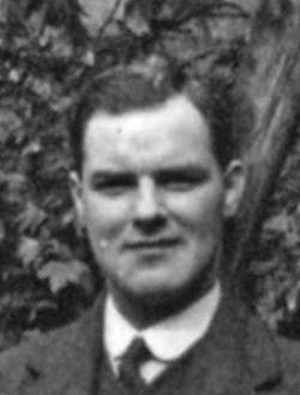
Bert Brocklesby, a school teacher from Doncaster, applied for exemption from military service early in 1916 on religious grounds. Bert went before his local and appeal Tribunals in February and April 1916, and was given exemption from Combatant Service Only by both. To Bert, this was an unacceptable decision – joining the Army, even in a Non-Combatant role meant going against his deeply held conscientious belief that war in all forms was a crime.
He was arrested as an absentee after refusing to obey the order to report to his nearby barracks to be enlisted into the Non Combatant Corps. Bert refused to compromise his principles in any way, and did not even take the step of signing his Army papers – denying the military authorities even this rudimentary control over his life.
For making this stand, and for disobeying other orders, Bert was Court Martialled and would soon become one of a group of Absolutists (known as the ‘Richmond 16’) sent to France from Richmond Castle, Yorkshire, as military prisoners. It seems that Bert managed to drop a cleverly edited field service postcard out of the train while being transferred to France for further punishment. This postcard alerted Bert’s local MP (who sympathised with the principles behind Bert’s objection to military service) that men were being transferred to the combat zone, where, considered to be on active service, they could be sentenced to death for disobeying orders.
Bert would find this out on arrival at Henriville Camp, Northern France.
On June 24th 1916, Bert’s sentence was read out in front of the Non-Combatant Corps Battalion to which the Army believed he belonged:
“The accused were tried by Field General Court-martial on the 13th day of June, had been found guilty and sentenced to death. The sentences had been confirmed by Field Marshal Sir Douglas Haig……………. and commuted to ten years’ penal servitude”
Bert was sent to Dyce Camp to quarry stone with primitive tools in atrocious conditions. Soon afterwards the camp was closed after the neglect of the men working there had resulted in the death of Walter Roberts.
Bert spent the rest of the war in prison, finally being released in 1919. He joined the Friends War Victims Relief service soon after his release, determined to not just protest against war, but provide aid and support to some of its victims.
Based on an article by the Peace Pledge Union.

Field service postcard, showing how Bert may have managed to alert the civilian authorities to the Richmond 16’s plight
Explore more memories from the ribbon
-
Reginald James Owen Thompson
Submitted by Josephine Parker. My Uncle – Reginald James Owen Thompson (son of Owen Thompson who is featured elsewhere on the Ribbon of Remembrance) lied about his age and forged his mothers signature to join the Leicester Fusiliers at the age of just 14. He served in France and later, after the First World War, he served in China.
-
Brig-Gen T W Stansfeld
The Stansfeld family have many connections with the regiment. Both Thomas and his brother older brother ‘Jock’ served with the regiment in 1880s and 1890s. Thomas’ son and nephew also joined the regiment and both saw action in the Second World War. Thomas Wolryche Stansfeld was born in Leeds in 1877. He joined the regiment in 1897 and quickly rose to the rank of Captain. Stansfeld fought in the War in South Africa including the Battle of Paardeberg. Stansfeld was a skilled rider and joined the regiment’s Mounted Infantry Battalion. He was involved in many actions against the Boers, including the capture of the Elandsfontein railway station near Johannesburg. He narrowly escaped death when a bullet smashed into his cigarette case, leaving him unharmed. Stansfeld’s battlefield experiences were a major asset to the regiment in the First World War. During the First Battle of Ypres he ordered his company to rapidly fire at different intervals; fooling the Germans into believing that they were facing a nest of machine guns. Stansfeld survived the battle and fought throughout the First World War. After the war Stansfeld held a number of senior posts, including Commandant of the Small Arms School at Hythe. He retired from the Army in 1929 and died on the 23rd February 1935.
-
John C Morris
John Charles Morris was from South Hetton. He was born in 1896 and was 18 when he enlisted in the Yorkshire Regiment as 14136 Private Morris. He served in the 8th, 9th and 10th Battalions and was awarded the 1915 Star, the British War Medal and the Victory Medal, as well as the Silver War Badge. He was wounded in December 1915 and again in November 1916. He suffered a gun shot wound to his left hand and lost part of a finger and substantial power and movement in his right hand. He also suffered a shrapnel wound to his left foot. These injuries precluded manual work due to a lack of power in his hands. After his discharge in December 1918 he was awarded a pension of 8 shillings a week and was subject to regular reassessments of his injuries. He died aged 61 in 1957.
